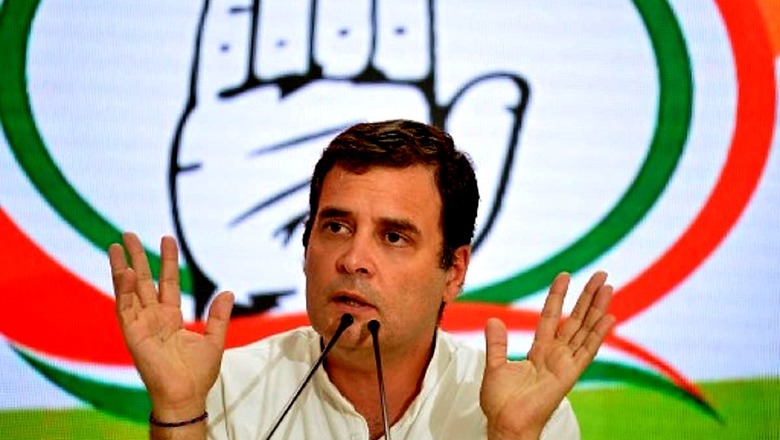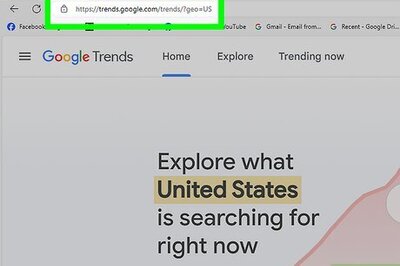
views
Even as time is running out for Rahul Gandhi to settle the leadership issue of the Congress, address drift and disquiet and handle the ongoing political crisis in Punjab, Rajasthan and Chhattisgarh, some ‘out of the box’ solutions are being proposed within the grand old party.
A section of thinking Congress leaders wonder why Rahul Gandhi should not consider taking up the post of the party leader in Parliament. It may not have the official tag of the leader of opposition but the combined strength of the erstwhile UPA in the Lok Sabha could easily grant Rahul the necessary heft to lead the opposition charge. As a ‘shadow prime minister’, Rahul Gandhi would have ample opportunities to shine and score over Narendra Modi government on a range of subjects such as Rafale and Covid-19. The build up towards 2024 is tantalisingly poised. For some, it is unlikely to be a repeat of 2014 or 2019 simply because Narendra Modi would be completing two terms in office, battling anti-incumbency, fatigue and age factors.
In the recent weeks and months, Rahul seems to be focusing more on research, homework and performance. Be it the ‘White Paper’ on Covid or his online interactions with the likes of Abhijit Banerjee, Raghuram Rajan, Kaushik Basu and others, Rahul came across as attentive and earthly. There is a view that whenever Modi-BJP-NDA find themselves on the decline, the voters may look for an alternative to a muscular, Modi-like leadership template.
Since 2004, Rahul’s parliamentary performance has been dismal. Throughout the UPA years, he wasted time in trying to tone up the functioning of National Students’ Union of India (NSUI), the Youth Congress, the Sewa Dal etc. without any tangible results. His refusal to work under Manmohan Singh deprived him a precious opportunity to be groomed under the good doctor. Any stint in infrastructure, foreign affairs ministry or in the Prime Minister’s Office would have pitched Rahul as a far more hands-on leader and given him greater confidence and insight into issues of governance.
ALSO READ | The Half of Half: This is the Opposition Strategy to Beat BJP in 2024
Rahul’s move to hug Prime Minister Modi inside the Lok Sabha in July 2018 in a rather non-consensual manner was churlish. Perhaps, it would not have won the approval of either his great grandfather Jawaharlal Nehru or his grandfather Feroze Gandhi, both men were great champions of parliamentary ethics, decorum and doing their homework. Nehru might have objected to the hug Rahul subjected the Prime Minister to and the subsequent tasteless wink, while Feroze Gandhi might have chided him about lack of homework on the Rafale deal. Those with long memory can recall how it was Feroze Gandhi who had done a thorough, diligent home-work before challenging his father-in-law’s government when he confronted Nehru on the Mundhra scam, forcing then finance minister T.T. Krishnamachari to resign.
If Rahul Gandhi indeed opts for a parliamentary role, the crucial issue of leaving or retaining the organisational charge — the post of All India Congress Committee president would assume utmost significance. It is said that Rahul’s thinking is shaped by a motto, “first deserve then desire”. As a believer in this saying, he is best equipped to take a clinical call.
There is a bit of history here. The Congress traditionally had a clear demarcation between its parliamentary and organisational wing so much so that there are separate constitutions governing them. In the Nehru era and initial years of Indira Gandhi, the party had two different leaders heading the respective posts. However, post 1977 electoral debacle and the vertical split in the Congress, a rather insecure Indira Gandhi clubbed the two offices for the remaining part of her life. This template was followed by Rajiv Gandhi, P.V. Narasimha Rao, Sitaram Kesri and Sonia Gandhi. Sonia is currently the ‘interim president’ of the AICC and leader of the Congress Party in Parliament.
While Rahul has been an ‘organisational man’ since 2006 when he was appointed the AICC general secretary, his record has been average except for a brief period during December 2017 to December 2018 when under his leadership as 87th AICC chief, the Congress did well in Gujarat Assembly polls, followed by electoral successes in Rajasthan, Chhattisgarh and Madhya Pradesh Assembly polls. The opposing point of view is that Rahul Gandhi’s inept handling of the selection of chief ministers for the party ruled states subsequently resulted in the exit of Jyotiraditya Scindia, fall of the Madhya Pradesh government and the endemic infighting in Rajasthan and Chhattisgarh.
ALSO READ | Purge or Compromise? Congress is Facing Hobson’s Choice in Punjab, Rajasthan and Chhattisgarh
Questions have also been raised over the failure of some key Rahul Gandhi aides who were given important posts and assignments. C.P. Joshi, Madhusudan Mistry, Mohan Prakash etc. failed to strike a rapport with the Congress old guard and the young guns. Rahul’s revolving door strategy and experimentation did not help the party either.
In the Congress circles, there were great expectations from Rahul Gandhi about some sort of generational change, but each time the Congress Working Committee (CWC) was reconstituted, it came packed with too many veterans and lightweights. Rahul Gandhi constantly shied away from disturbing the existing power equations within the Congress. This status quo-ist approach (perhaps unwittingly) damaged the party’s long-term interests.
There are several leaders vying for the post of Congress president and leader of the party in the Lok Sabha. For the organisational assignments, Kamal Nath scores over Mukul Wasnik, Ashok Gehlot, Bhupesh Baghel while in the Lok Sabha, Shashi Tharoor and Manish Tiwari fancy themselves as contenders. Interestingly, none of them wish to contest but grab the office after securing Nehru Gandhi family’s blessings.
Read all the Latest News, Breaking News and Coronavirus News here.

















Comments
0 comment